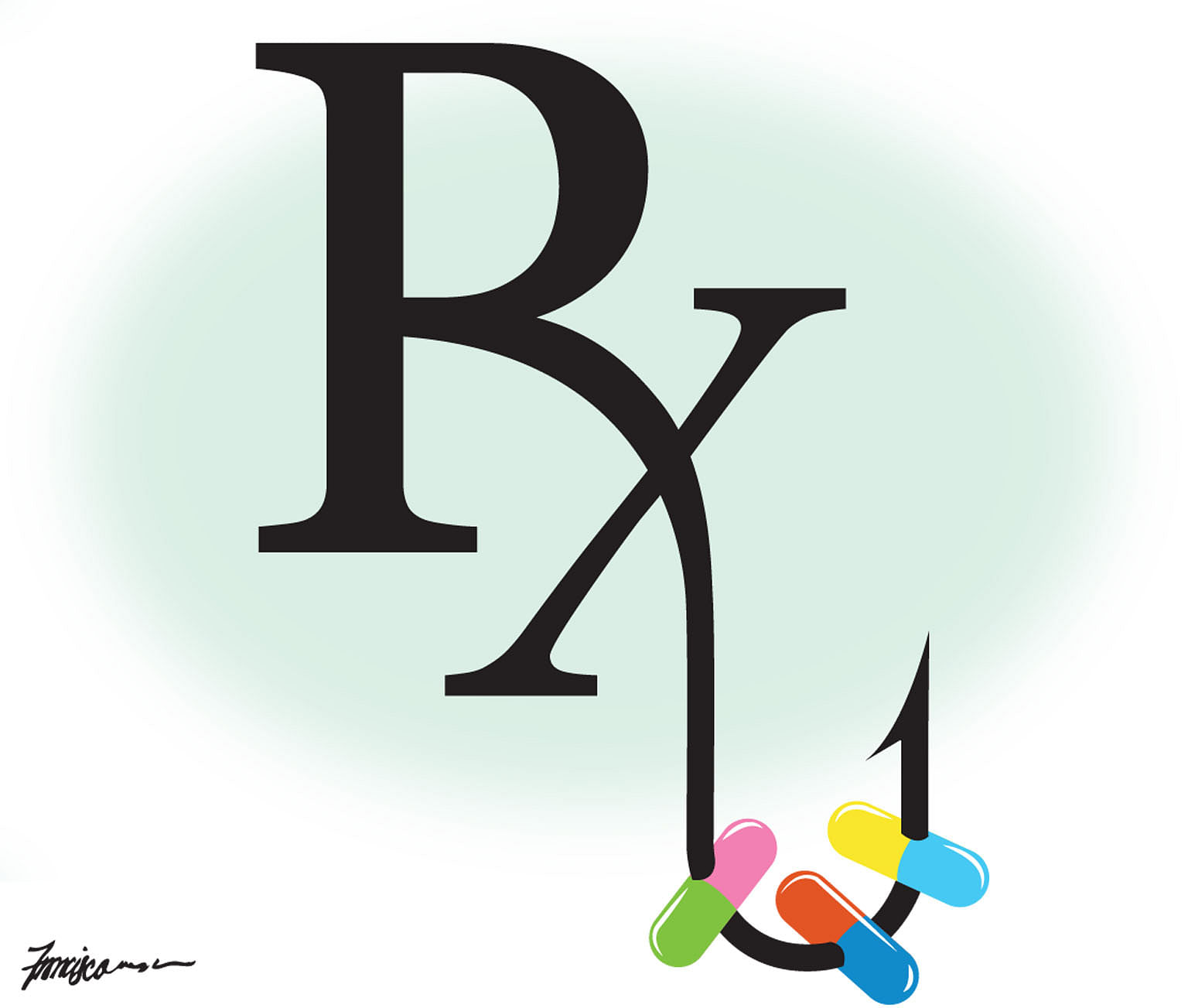The US is in the grip of an opioid crisis with an estimated 145 Americans dying daily from overdose of opioids and other narcotics; and scientists are saying that this accounts for the falling life expectancy in the world's richest and most powerful country.
According to a co-director of the Opioid Research Collaboration at Brandeis University, as reported in a recent issue of The New Yorker magazine, one pharmaceutical company, Purdue Pharma, takes "the lion's share" of the blame for this public health crisis.
Purdue makes OxyContin - a powerful painkiller, and a long-acting and addictive opioid. In May this year, a US federal court found three of its top executives guilty of criminal charges that they had misled regulators, doctors, and patients about the drug's risk of abuse and addiction. The same New Yorker article states that the marketing of OxyContin "relied on an empirical circularity: the company convinced doctors of the drug's safety with literature that had been produced by doctors who were paid, or funded, by the company". Within five years of its launch in 1995, OxyContin was generating a billion dollars a year in revenue for Purdue Pharma.
The pharmaceutical industry is one of the most profitable businesses in the world, and it is an indispensable engine of healthcare; the various drug companies (a number of which are Fortune 500 companies) have the means to conduct research, discover and develop drugs that doctors prescribe to repair and save lives, and relieve suffering.
Drug development is a very complex, expensive and resource-intensive process: it typically takes a drug 12 years from the initial stage of its discovery to reach the market, and it may cost more than a billion dollars for it to get there. Drug companies must recoup that cost, and they need the profits to innovate and put new drugs in the pipeline.

And, to reach out to doctors to prescribe their drugs, these companies dispatch their armies of foot soldiers - the sales representatives (commonly called drug reps). These reps serve a useful role: they inform doctors of the potential benefits, side effects and therapeutic dosing of the drugs, and hence assist doctors on the proper use of these drugs. And they may also be an important conduit of information from doctors to the drug companies, particularly on any adverse reactions that the doctors have observed in their patients.
GIFT BEARERS
But the core task of a drug rep is to promote the company's product. Together with the information that a rep gives a doctor - usually pithily delivered in the doctor's consultation room, and with colourful charts and supplemented with published papers of studies that are more often than not funded by the same drug company; the rep would also come bearing gifts which can range from trinkets (pens, flash drives, sticky note pads, penlights - all irresistibly attractive for their everyday usefulness; and branded with the company's logo) to sponsored overseas trips to attend medical conferences.
These gifts have a subliminal effect: social science research has found that giving gifts creates relationships and engenders a certain sense of obligation and reciprocation in the recipients.
Writing in the Journal of the American Medical Association, a group of academic physicians from Columbia and Harvard warned that even cheap gifts can influence a doctor's prescribing practices. For instance, stationery bearing the name of a new product can enhance product recognition and nudge a doctor to prescribe that particular drug over others that might just as good and cheaper.
And small gifts may be even more subversive because it lulls doctors into an assuring complacency that their professional integrity couldn't possibly be influenced by such trivial and seemingly innocent gifts. But as one commentator puts it: "The sell is much more subtle. All the advertiser may expect is that, other things being equal, if you subsequently have to make a decision that it is more likely to be in the favour of the advertiser."
THOUGHT LEADERS
Drug companies are also a big supporter of educational activities for doctors. Here in Singapore as in a number of countries, practising doctors are required to keep themselves updated with continuing medical education (CME) in order to maintain their licence to practise; most doctors earn the necessary credits by attending educational sessions, lectures and medical conferences.
Some of these educational sessions are sponsored by drug companies and though the support is nearly always through "an unrestricted educational grant", which should mean that the sponsor does not influence the content of these sessions, the topics and speakers would often be selected by the drug companies.
These speakers are usually prominent researchers and clinicians whom the drug companies think have the persuasive power to affect the prescribing behaviour of other doctors. Called thought leaders or key opinion leaders in the ego-boosting parlance of the industry, these individuals receive payments and all-expense-paid trips to those places where they deliver their talks.
The audience would be mainly other doctors who are sponsored by the same drug company. (Studies have found that doctors who attend a drug company-sponsored CME or accept travel funding for conferences were more likely to prescribe the sponsor's drugs.)
One of the most rigorous critics of the pharmaceutical companies and their influence on doctors is Dr Marcia Angell, former editor-in-chief of the venerable journal, The New England Journal of Medicine. In her book, The Truth About The Drug Companies, she wrote that "drug companies sway doctors with food, flattery, and friendship" and where thought leaders are concerned, "flattery is the key".
In my time as a doctor, I have taken my fair share of the industry's largesse, including sponsored trips to overseas conferences with convivial meals thrown in.
My contact with drug reps started at that fledgling stage when I was training to be a psychiatrist. I wonder now, in retrospection, whether this early fraternisation with these congenial drug reps have normalised it and made the presence of these reps a casual fixture in our practice; and perhaps had even inculcated in me a sense of entitlement and the unquestioning acceptance of their gifts.
In time, I too was invited to be a "thought leader" and sponsored to give talks at medical meetings - and I can vouch for that very flattering treatment laid out by the sponsor that was often more suited for a diva than an obscure psychiatrist.
My last speaking engagement was a number of years ago when I was flown (business class) to a neighbouring country for a two-day meeting to give a talk and conduct a half-day workshop with other speakers from Australia and the United Kingdom. The seminar was held in a lakeside five-star hotel where I was also put up for two nights. There was no overt suggestion from the sponsor as to what I should talk about, but obviously it had to be in sync with the theme of the meeting. There was, however, a discreet request if I would consider having the logo of the company on my presentation slides - which I refused.
On the flight back, something turned in me. It wasn't quite a searing moment of epiphany - rather, it was a culmination of that growing sense of unease that something was out of joint.
From that day onwards, I stopped accepting all these sponsored talks and trips, stopped seeing any of the drug reps - even though I still have some affection for a couple of them, and stopped accepting all manner of gifts. But I do occasionally take published papers from some of the more persistent reps who manage to waylay me along the corridors of the clinic; these papers are informative in a way and if anything, they also prompt me to go online and look for other papers to arrive at a more balanced view of that drug.
It is easy to demonise the pharmaceutical industry and decry their alleged machinations, but we can't deny the fact that overall, the pharmaceutical industry has improved - if not saved - tens of millions of lives each day. Nor are doctors compelled to consort with drug reps who are mostly hardworking people and doing their job as well as they can.
Interaction with the drug companies is not unethical, and it can be useful. The Singapore Medical Council, which is the licensing board and disciplinary body of doctors, however, tries to draw a line on this interaction ; its Ethical Code and Ethical Guidelines permit doctors to receive only "small, insubstantial gifts which cannot be regarded as inducement", and allow them to participate in industry-sponsored talks as long as it "does not occur in such a way as to appear to endorse products, or to persuade patients or members of the public to use the products".
The nub of the matter is about managing that potential conflict of interest when our primary interest as doctors - which is maintaining our professional integrity and upholding the interests of our patients - might be insidiously subverted by our secondary self-interest (for example, financial recompense, recognition, perks).
Most doctors, I'm certain, are able to immure themselves to these secondary influences and make decisions based on the best clinical interests of their patients even while continuing their contacts with drug companies. But I suppose I lack that confidence and self-assurance that despite whatever good intentions I might have, I wouldn't go astray amid the pressures of obligations, relationships and that heady feeling of self-importance.
- The writer is vice-chairman of the medical board (research) at the Institute of Mental Health.


